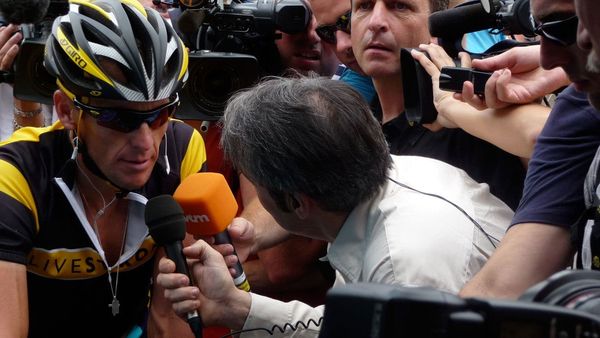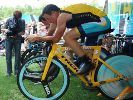Eye For Film >> Movies >> The Armstrong Lie (2013) Film Review
The Armstrong Lie
Reviewed by: Owen Van Spall

Alex Gibney is interested in power. How power is gained, used, abused, and protected. This has led him to focus on institutional power, such as in his 2012 documentary Mea Maxima Culpa, which blasted the Catholic Church’s decades-long failure to deal with sexual abuse. Gibney also has in the past narrowed his focus to look at powerful individuals, as in Client 9, which tracked the downfall in a prostitution scandal of the forthright, aggressive and charismatic New York Governor Eliot Spitzer. His new documentary The Armstrong Lie also takes as its subject a larger-than-life figure with a similar rise-and-fall trajectory to Spitzer, in this case the disgraced American Tour de France winner Lance Armstrong.
Gibney’s film actually began before the doping scandal finally overwhelmed Armstrong’s refutations: the filmmaker began recording the cycling superstar way back when the seven-times Tour de France winner planned a comeback in the 2009 competition. Gibney only resumed his study of the athlete in 2013, following Armstrong’s public confession to years of doping on The Oprah Show in January that year. The resulting collage of footage from many years seems to have driven Gibney, in his voiceover, to analyse himself in his own film a little more than usual, given he found his own emotions increasingly conflicted, as Armstrong tried to create and control the narrative around his planned comeback and later disgrace.

A constant theme in Gibney’s films is how the acquisition of power, and perhaps even more so, the maintenance of that power, always leaves victims in its wake.
Armstrong is a character seemingly built for a Gibney film. A Texan from a humble background, who never knew his father and who quickly grew into a competitive sportsman despite a knife-edge fight with cancer, Armstrong’s success on the cycling track in the 1990s and beyond, paralleled a growing competitive streak, a need to dominate, in all areas of his life. This meant crushing opponents on and off the track, until finally in June 2012, the US Anti-Doping Agency ended this run by charging Armstrong with having used illicit performance-enhancing drugs, announced a lifetime ban from competition, and stripped him of all his Tour de France titles won between 1999 and 2005. Though Armstrong both before and after the scandal broke is given a great deal of interview time in Gibney’s film, much the damning onscreen testimony of his epic fall comes from those who suffered personal and professional abuse at his hands (or the hands of his lawyers and PR team). There are a lot of them.
Gibney's film combines new and historic interviews, news stories, filmed documents and other video footage from roughly three time periods to construct its picture of this complex man. Armstrong’s early life is briefly covered, as is his tough battle with cancer, but the story really gets interesting in the late 1990s when Armstrong joined the US Postal Service team, America’s wild card entry in the Tour de France. His first Tour de France victory in 1999 instantly propelled him to global fame, a seemingly glorious comeback from near-death.
Far from being players in a story of innocence gradually worn down, however, Armstrong and his US team seemingly launched into cheating immediately. The doping techniques that the interviewees rattle off sound like something out of a spy thriller - with tales of motorbike drop offs in the mountains and faked bike repair stops allowing the team to dope out in plain sight in the tour bus even as the press surrounded them outside. Some of the doping methods are just outright bizarre, with blood transfusions of oxygenated blood being a particularly gruesome tactic.
As interviews with Armstrong’s former team mates and other talking heads confirm, the mutual feeling in the US team then and after was that doped teams were the new level playing field in an era when investigations and raids were resulting in whole cycling teams being thrown out of competitive sport by various anti-doping agencies. Gibney’s film documents so many cases of cyclists, many of whom stood on the podium with Armstrong or served on his team in those years, being convicted of doping that the entire global sports cycling industry and its policing comes across as borderline farcical.
As is his style, Gibney also unearths the quiet men behind the throne, in this case doctor Michele Ferrari. A figure as fascinating and as shady as Armstrong, Ferrari was an Italian cycling specialist who was determined to narrow cycling down to a matter of science, like he was some kind of aircraft engineer trying to squeeze the last ounce of thrust by tinkering with the fuselage. Repeatedly in the spotlight over the years for doping scandals, Ferrari’s relationship with Armstrong repeatedly left the cyclist open to the charge of doping, yet arrogantly Armstrong believed he could keep this taint at arm's length. Gibney gets Ferrari on tape, a rare thing these days apparently. He also questions the close relationship between the UCI cycling body president Hein Verbruggen and Armstrong. Armstrong brought a lot of money and attention to international cycling with his well publicized success, and offered donations to the body. Did that buy him protection above and beyond what should have been the limit?
Footage from the 2009 Tour de France comeback forms much of Gibney’s film - as he was allowed unrestricted access to Armstrong in the run up to and during the race. Apart from some exciting cycling footage, it allows the uninitiated a fascinating glimpse into the scale of the Tour de France challenge and various riding tactics to overcome it (such as using the wind for propulsion, and using other team mates as wind blocks), Gibney contextualises this 2009 footage in light of the scandal that broke shortly after. Why he asks, did Armstrong want to compete in the 2009 race and open himself up to exposure when he had seemingly beaten down all the charges of doping that had dogged him up until then? Was this a last ‘fuck you’ to his detractors? Was it a way of proving he could still win when racing clean (as Armstrong continues to claim in the film)? Was it the hunger to compete, to dominate, still burning inside him?
Interview footage of Armstrong himself, before and after the fall, suggests a charismatic and driven man who Gibney himself admits to rooting for in the 2009 comeback attempt.
Always there was the desire with Armstrong to control the narrative, whether it be portraying himself as a cancer survivor who could not stop fighting in all areas of life, or as the cheater who nevertheless would insist his 2009 race was clean and who genuinely was commited to his Livestrong cancer charity. These are powerful human stories that Gibney suggests many were willingly deluded into believing time and time again. But against these more appealing portraits lie a stack of revelations about dirty tricks and smears deployed by the Armstrong camp as the doping allegations began to drag him down. Whistleblowers found themselves sued, their credibility and mental states questioned, and openly humiliated. In one scene Gibney shows how Armstrong gloated over how he had arranged for a former teammate who had blown the whistle to be the only American reporter allowed to interview him on the 2009 race, a very personal insult and another act of domination.
The Armstrong Lie confirms Gibney’s position as one of the US’ foremost documentarians, and lovers of such films should pray that, unlike Armstrong, Gibney does not lose this number one spot any time soon. It is a confidently assembled and well-argued piece of reportage that blends brisk pacing, captivating interviewees and superb cycling footage to tell a gripping story of one of the great sporting crimes of the century and the fascinating, unfathomable man at the center of it. Do not think for one second that an interest in cycling is a prerequisite.
Reviewed on: 21 Oct 2013
















